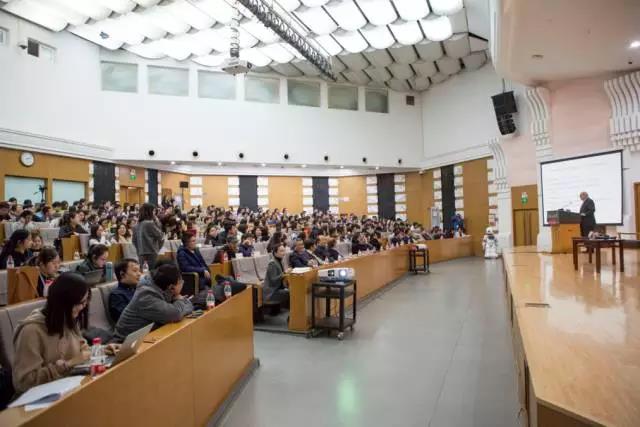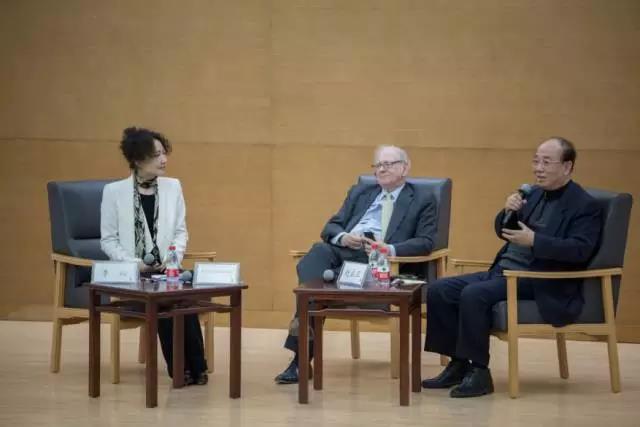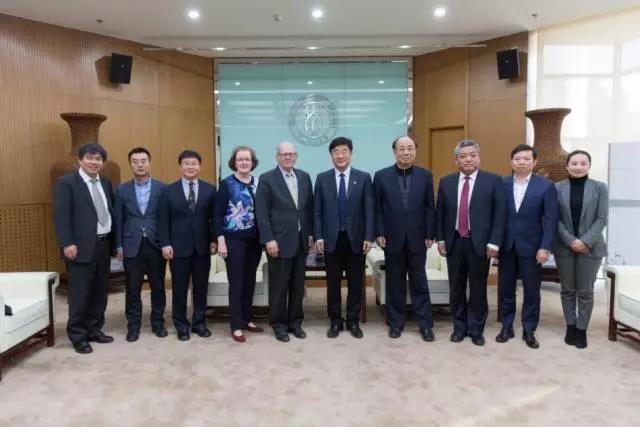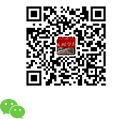
President Liu, on behalf of the university, extended warm welcome to Mr. Kahn. He expressed that Mr. Kahn, as one of the most eminent scientists in the history of Internet development, played a pioneering role in this field and made a great contribution to the social development. It was believed that Mr. Kahn’s visit would provide beneficial guidance to both our teachers and students. In 1978, RUC took the lead in establishing the major, applying the knowledge of mathematics and information technology, in the field of economic management. In recent years, we have promoted the cooperation and interaction with law, IT, journalism and communication and carried out a series of effective teaching, research and consulting services in the fields of big data's excavation, artificial intelligence, network social governance and so on. Journalism and communication is one of the earliest subjects affected by the Internet. In the construction of "double first-class", RUC actively responded to a series of new propositions put forward by the rise of Internet technology. We are committed to form an education style with unique characteristics in the fields including Internet public opinion and big data, public communication and virtual social identity, and also so international communication and the construction of a community of shared future for mankind.
In his speech, Mr. Kahn talked about the great contribution of the Internet to human civilization progress and the trend of Internet transformation, introduced the idea of DOA and the Handle System, and also shared his opinions on the value of Internet on the exchange of human civilization. During the dialogue, Mr. Kahn and Zhao Qizheng, the dean of Journalism and Communication School of RUC, exchanged views on the Internet, and answered the questions from You You, the robot designed by Netease and from other journalists and audiences.
Kahn believes that the Internet connected various objects, dealt with various data packets and achieved computer interaction when it first appeared several decades ago. Nowadays, digital objects have been the main objects of computer processing, and we should create a digital object society. “The scale of information and the Internet itself have now expanded by millions, but its core remains consistent—its key technology is still 'connecting'."
The idea of DOA: from a single root node tree to a polycentric open structure, from complexity to simplicity.
"We are increasingly relying on the Internet technology to manage information, so how to do that? How can the information be better preserved? And how does each system interact with each other in the future," Mr. Kahn raised questions at the beginning of the speech.
As Mr. Kahn said, the history of Internet is less than 50 years, and that of World Wide Web is no more than 20 years. Undergoing rapid development, the problems including information security, redundancy and disordered management still exist and even intensify.
Robert Kahn delivered a speech
Mr. Kahn believed that when the Internet appeared a few decades ago, it was a combination of objects, dealing with numbers.
Based on this, Kahn proposed the "Digital Object Architecture" (DOA) which provides a framework that can process all kinds of information. Being open and independent from technology, it is a further extension of the Internet logic. The core of the architecture is the Handle system mainly used for the registration, analysis and management of digital object identification, which can effectively improve the security and information sharing of Internet applications.
The DOA architecture improves Kahn’s Internet architecture. Tree structure is the traditional structure of Internet with the root node in the United States. The concept of DOA is to break national boundaries and helps realize the transition of the Internet to a “multi-center open structure”.
"The design of the system has been constantly evolving until these objects can communicate directly." Kahn said. The DOA architecture not only enables the digital objects to interact directly, but also supports other information systems and direct interaction between them with a low threshold.
Kahn expects that the DOA architecture will become an infrastructure for the Internet, making the previously complicated operations simple and convenient. "In the future, as the Internet becomes increasingly complex with more and more information and applications appearing, the DOA framework will lay a good foundation so that the Internet is accessible to anyone and any organization boundlessly."
The Dialogue with Zhao Qizheng: From nothing to everything, from artificial intelligence to human wisdom
“Who am I?” was one of the three major philosophical propositions. The dialogue between Kahn and Zhao Qizheng, who once majored in the nuclear physics, was based on “Who is the Internet?”
"The Internet is like air to us—it is accessible everywhere and at any time." Zhao Qizheng said that the reason why Chinese people like the Internet is consistent with the philosophical thought of Lao Tseu, the great philosopher of ancient China, "Do nothing and do everything." It can be used whenever needed, and does not seems to exist when not needed.
Kahn proposed that the Internet will always exist and continue to evolve. The future of the Internet is not a choice of networks, but the collaboration of computers.

Robert Kahn and Zhao Qizheng
When it came to artificial intelligence, Zhao Qizheng believed that robots are smart while humans are wise. He made an easy-to-understand explanation that Einstein, Newton and other scientists had developed the theory of relativity, the third law, etc. “But robots are not able to do this type of academic research, so they will not exceed people intelligently.”
However, Kahn believed that big data and cloud computing were all slogans for artificial intelligence and what artificial intelligence described was a request. Kahn thought that many parts of human experience could be transplanted to the machine, so the insight it possessed would become stronger and stronger. When it came to the Hollywood-style threats of future development of artificial intelligence might posed to humans, Kahn believed that technology itself was not good or bad. “What’s needed is to introduce a reasonable control mechanism to prevent it from losing control.”
Zhao Qizheng also raised the social worries brought about by the Internet. He believed that the Internet did provide a lot of convenience for humans, while heavy dependency on the Internet was developed as well. People indulged in the services provided by the Internet which might deprive themselves of some functions. He proposed that humans might be divided into two categories facing the widespread use of the Internet -- one enjoyed these services while the other actively grasped more knowledge and avoid being restricted.
While Kahn agreed with Zhao Qizheng, he believed that there would be a third category of people: "This type of person is busy creating the future, always thinking about what’s next and what is the future?" He said that humanity could not stop the wheel of history and the best way to anticipate the future was to create the future.
During communications with reporters and audiences, Kahn and Zhao responded to changes in the news communication caused by the Internet.

DONA Legal Adviser, Mrs. Kahn Patrice Lyons, CNOOC Chairman Assistant Sun Yi, DONA Global MPA China Consortium Co-Chairman and Chief Expert, Beijing Capital Innovation Technology Co., Ltd. Chairman Zhen Xihui, DONA Global MPA China Consortium Co-Chair Gao Zhengang, Chairman of Beijing Cernado Information Technology Co., Ltd., Xu Jun, General Manager of Micro Media (Beijing) Culture Media Co., Ltd.; Xu Qinhua, Deputy Director of the Research Department of Renmin University of China; Hu Baijing, Executive Dean of School of Journalism, Associate Dean Zhou Yong, Zhang Huifeng, Wang Runze, deputy party secretary Meng Bin and Zhao Yunze attended. The speech and dialogue activities were hosted by Li Shu, an associate professor of journalism.
Robert Kahn and Winton Safe are called the "Father of the Internet." The TCP/IP protocol they invented together was the basic protocol and the most important technology used in the transmission of Internet information throughout the world, which promoted the creation of the Internet and various applications on the Internet. For a long time, Kahn has devoted himself to the research and development of major technologies such as open network platforms, information system infrastructure, and digital object architecture.



